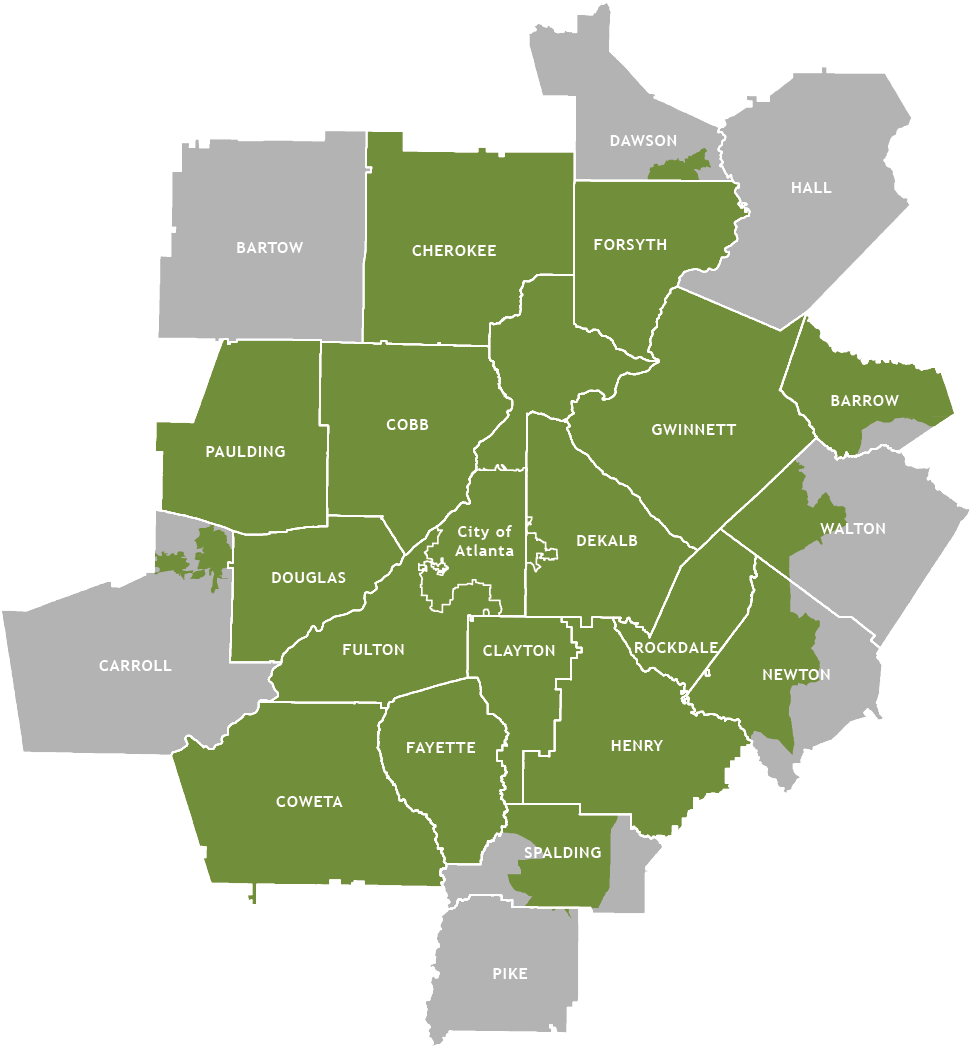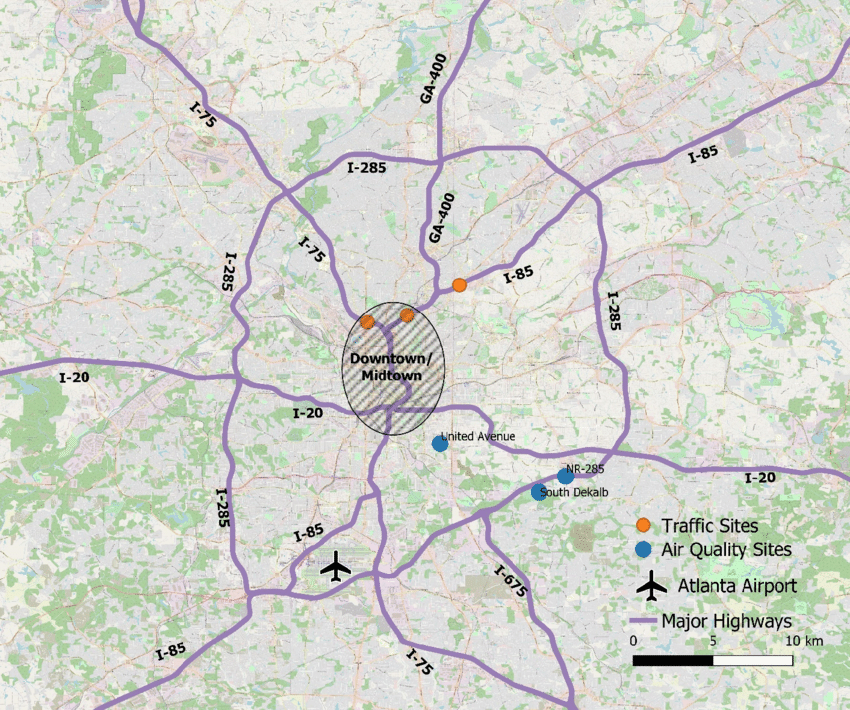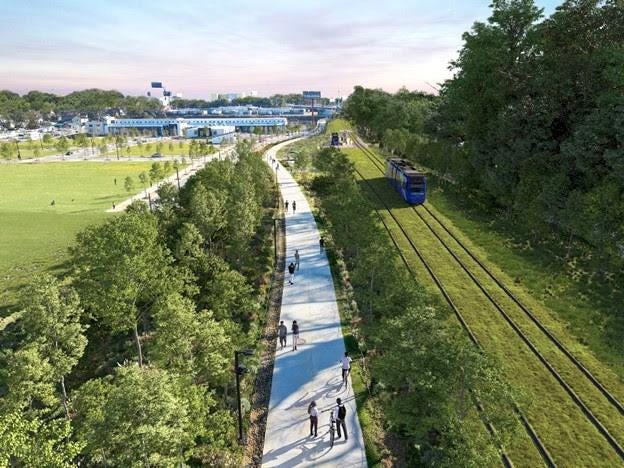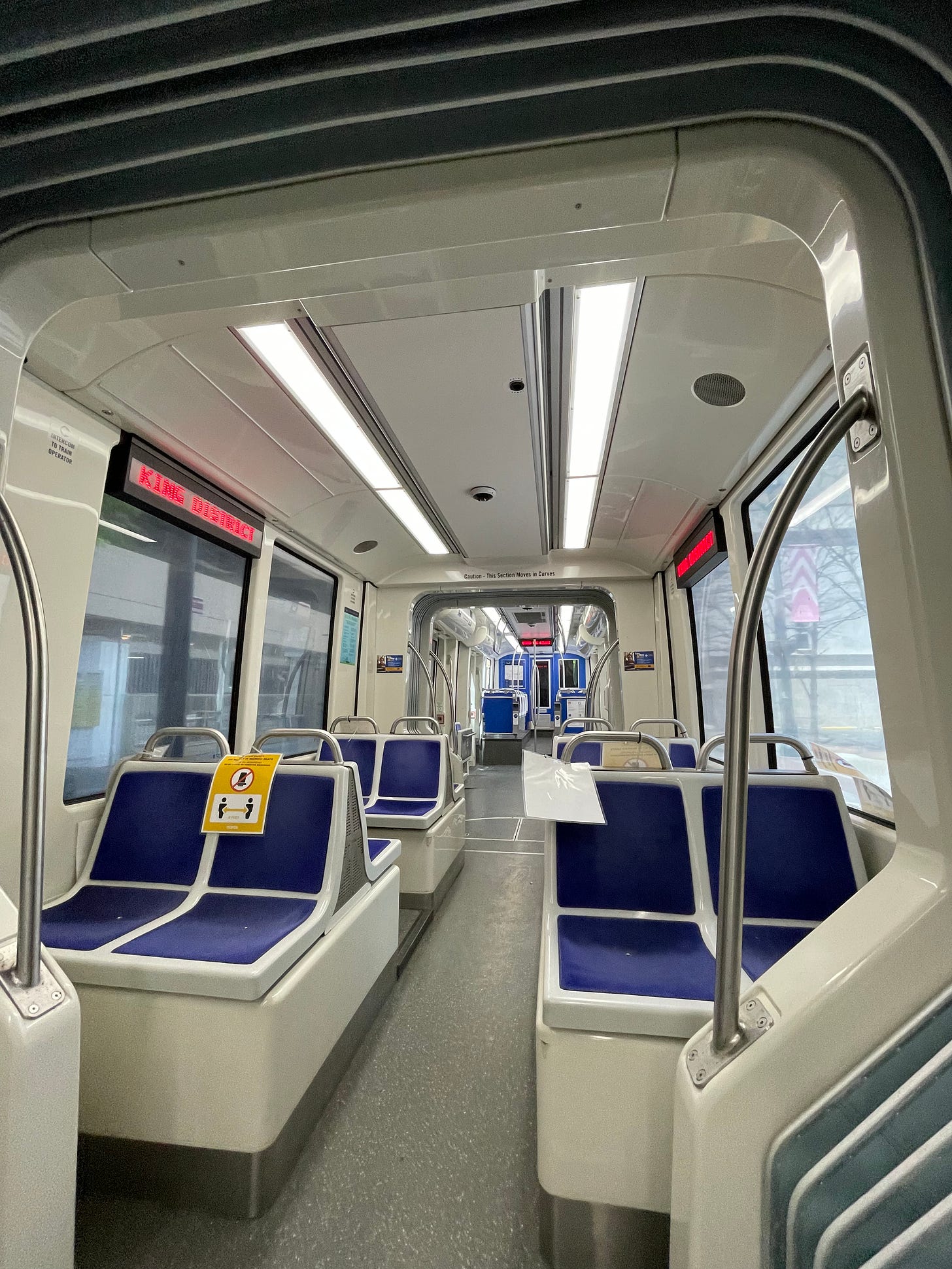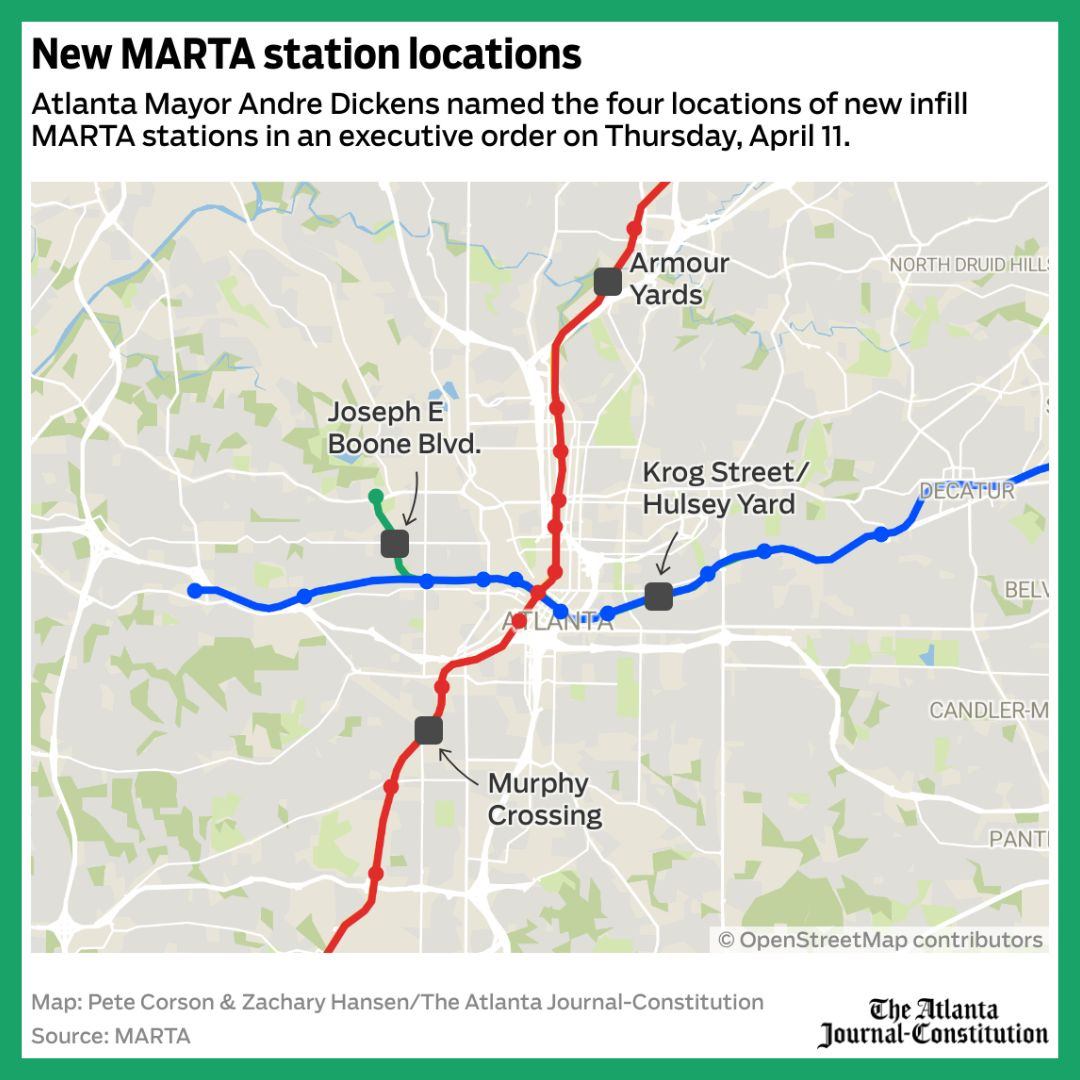The unfulfilled promise of Atlanta
Residents want transit expansion and the Beltline to be done right, but existing reliability issues and political resistance limit progress.
Summary of 24 responses between July 20, 2024 and June 4, 2025.
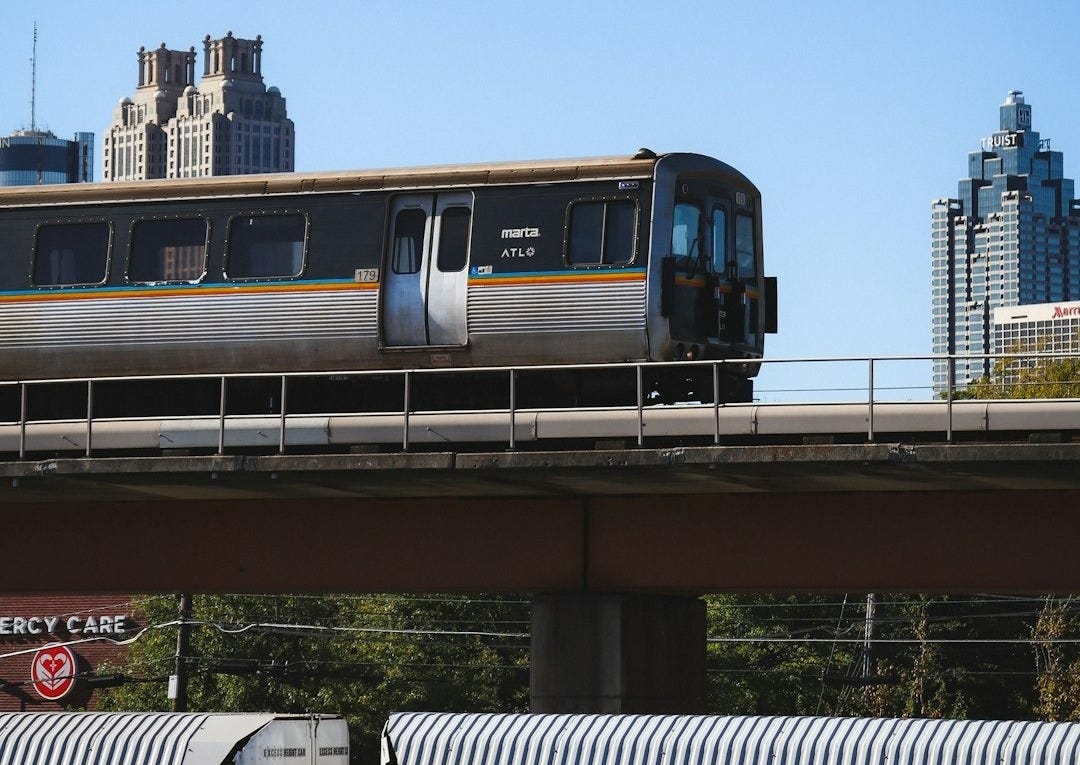
Based on feedback from my previous post about Denver, I’m now asking some of you to graciously help edit these posts, almost like a co-writer. I think it makes these more detailed, and hopefully highlights some of the incredible people in this space.
Today’s editor: Lucero Méndez
Hello! My name is Lucero Méndez, and I am a rising senior at Georgia State University majoring in Public Policy with a minor in Urban Studies.
Currently, I am interning in Puerto Rico for a local nonprofit working to bring sustainable and affordable housing, mental health resources, and emergency relief to the island. I also founded and manage PantherSWAP, a program that allows students and faculty to donate and receive free clothing at my university. In my free time, I fence epeé, hangout with family and friends, and solve the New York Times games.
So happy to be Atlanta’s editor because I love this city. Here is my LinkedIn if anyone wishes to connect.
Intro to Atlanta
Metropolitan Atlanta is centred on the core counties of Fulton, Gwinnett, Cobb, DeKalb, and Clayton. The City of Atlanta is mostly located in the middle of Fulton, with a small offshoot into DeKalb.
MARTA is Metro Atlanta’s primary transit operator. They run buses, heavy rail (subway/metro), and a streetcar, mainly serving Fulton (where the City of Atlanta is located), DeKalb, and Clayton counties.
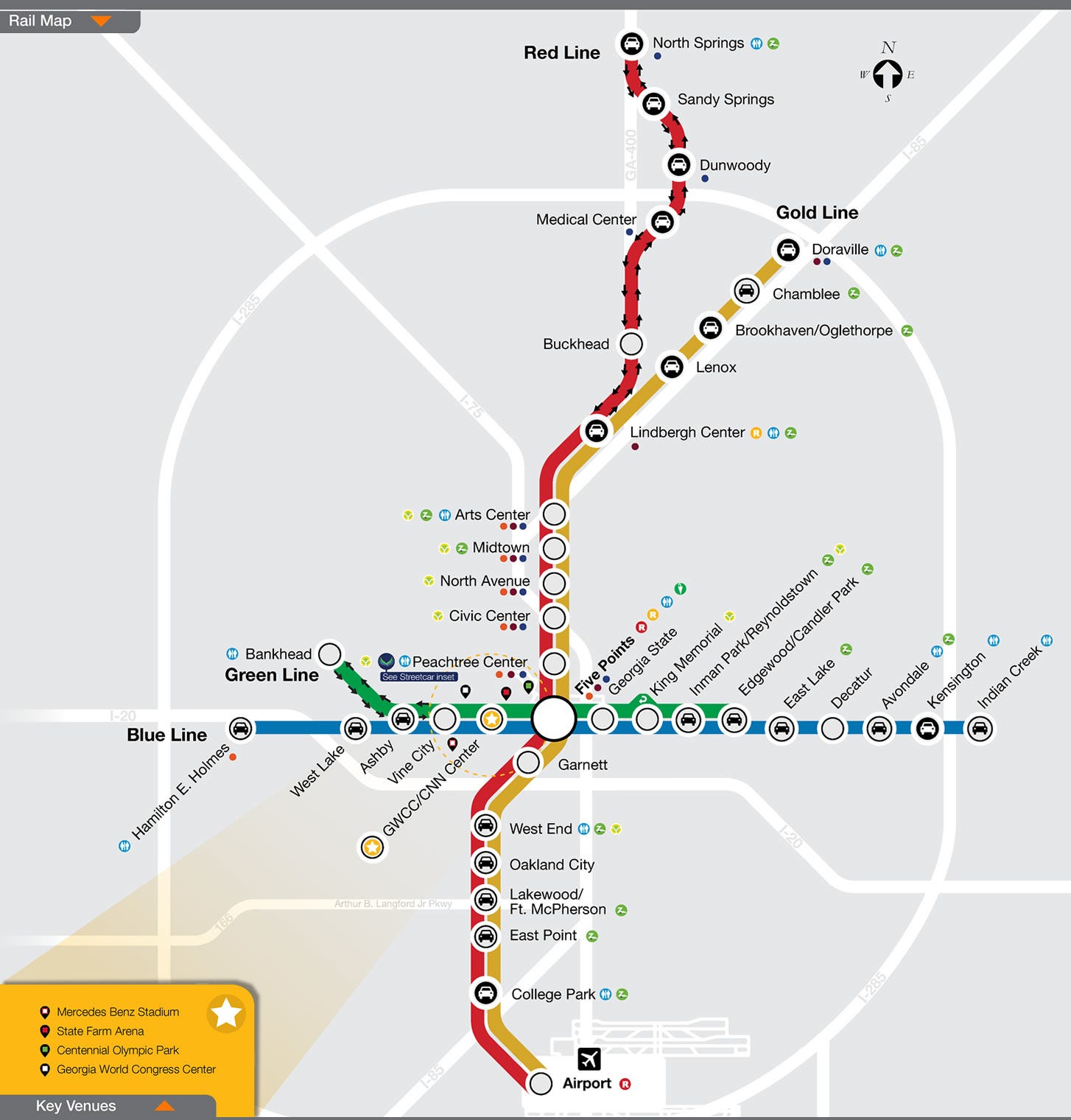
A full system map (with more than rail) shows county divides more clearly.
Key findings from viewers
1. People want system expansion
11 respondents (46%) want to increase MARTA’s reach, with 3 respondents specifically highlighting expansion into the core suburban counties of Gwinnett, Cobb, and Clayton.
Realistically, I would like MARTA to at least cross the border of Cobb county… ideally an extension of the green line through Cumberland, an extension of the blue line to Mableton, and a connection between those two. This would connect lower income communities in Cobb County to jobs in Atlanta and Cumberland, which is a business district and sports hub.
Note that counties have to vote for MARTA service.
Fulton and DeKalb were the only 2 to initially approve service in 1971, and Clayton voted to join in 2014 - but only has bus routes so far. Cobb and Gwinnett have - at times narrowly - voted against MARTA entering, multiple times, hence the lack of service there.
5 respondents (21%) also called for better connectivity for suburbs to reach downtown, potentially through new regional rail services.
I live in the metro-Atlanta area, and basically everyone here works in Atlanta. I'm lucky, since my office is on the north side of I-285 (the highway that encircles Atlanta that is the 7th level of traffic hell). My drive is only 30-40 mins, but I have colleagues who spend over an hour commuting one way!
I'm from the suburbs so I would just love for a way to get to Atlanta without having to endure a 45 minute drive, both ways.
Finally, 4 respondents (17%) specifically highlighted the limitations of the current hub-and-spoke setup of rapid transit.
There’s an understanding that bus improvements could ameliorate the situation without the price tag of rail. Bus lines are already well-connected to the metro, and the MARTA board also recently approved the NextGen Bus Network, a significant bus service redesign that’ll expand frequent service areas and bring daily service to all routes, among other improvements.
However, there are no firm plans to address the lack of orbital transit “rings” around the city.
The Beltline (more on this in the next section) may solve that for the city centre, but many homes and businesses are clustered near I-285, the interstate that encircles the city ~10 miles from the core.
No buses or rapid transit currently run along this perimeter, although the potential addition of transit express lanes on portions of I-285 is currently being studied. Among the many roadblocks to true orbital rapid transit is the need for buy-in from Cobb county.
2. Unreliability is an important frustration
Only 3 respondents (13%) directly brought up unreliability of transit, but were adamant that this was the root cause for other popular issues like low frequencies and public apprehension to using transit.
I usually give MARTA a 20 min margin-of-error when I use the system, and it eats it every time…
How can the average person believe MARTA can be trusted to get them anywhere?
In a broader sense, unreliability - and the low frequencies that come with it - makes it difficult to gather public and political support for transit expansion and improvements; it feels like burning money on something that doesn’t appear to work.
However, this point is difficult to definitively quantify and may be area-specific. One respondent detailed that MARTA trains tend to be reliable and on-time, at least on the parts of the red and gold lines that they frequent. They noted specifically that buses are a different story; they’re harder to track on transit apps and can be extremely variable.
3. “Politics” hampers progress
6 respondents (17%) explicitly mention that they understand how a lack of MARTA expansion is largely a result of voter decision-making. 4 respondents directly bring up race and social issues contributing to suburban counties voting against MARTA.
It feels almost hopeless to talk about public transit here. Everyone complains about traffic, but so many are terrified of making commutes longer, blocking cars, or giving suburban access to city people…
I think transit in the city has a lot of potential, it just needs more support from the public.
Going further, 2 respondents feel that a lack of state funding is a core reason for the region’s transit struggles. MARTA has historically not received meaningful operational funding from the state of Georgia; this is unlike cities like Boston and LA, who receive funding earmarked explicitly for public transit from their respective states.

Finally, 2 respondents specifically expressed disappointment about several light rail projects scaled down to BRT, namely Clifton Corridor and Campbellton Road, especially when a half-penny sales tax for MARTA improvements was passed in 2016.
The bus network is decent and improving. But when the transit agency promised light rail, then switched to BRTs, it left a bitter taste.
What projects people want
1. Beltline Light Rail
For context, the Beltline is a 22-mile former rail line encircling Atlanta’s downtown core. It’s being converted into a near-continuous multi-use bike/walking corridor with parks, shops, restaurants, housing, and connecting outdoor trails.
Part of the original proposal was to also have light rail running on the Beltline, creating an orbital transit ring that connects to existing radial routes. 10 respondents (42%) mention this project, all neutrally or positively, with 8 (33%) explicitly in support.
However, the status of Beltline light rail is uncertain, at best.
There were initial plans to extend the existing Atlanta streetcar eastward to reach the Beltline near Krog Street, then run north along the corridor to Ponce City Market (a popular retail, restaurant, and residential cluster).

A March 2025 announcement by the Mayor scoped this down to only reach Krog and not further, so rail would not run “in” the Beltline. This directional shift is paired with a claim to bring light rail to the Beltline’s Southside Trail first instead of the Eastside, serving more transit-starved areas sooner. However, this undeniably delays the introduction of any light rail on the Beltline, and many question the decision’s true intentions.
Going further, Beltline light rail has been further muddled by suggestions to use alternative mobility technologies instead, like driverless pods and more micro-mobility options.
All this continues to withhold potential improvements to the current streetcar line, which received criticism in many responses.
It runs in the street and doesn't have signal priority and the places it goes aren't very useful.
It only saves you five min but when you factor in the up to 20 min wait... it's actually more efficient to walk.
Taking a step back, there are 2 main advocacy groups when regarding Beltline light rail:
Beltline Rail NOW! (BRN) - in support, if you couldn’t tell by the name 🤓
Better Atlanta Transit (BAT) - against
Nathan Davenport, a local advocate, recently created an great overview of the situation:
And some thoughts from our editor Lucero:
Whenever I walk around the Inman Park neighborhood (next to Krog Street trailhead), many houses have yard signs for and against Beltline rail. In my classes, the need for rail is debated. I wouldn’t say it’s dividing Atlanta, but people definitely have their opinions on it. Some say it is too expensive and will disrupt business, others say it will truly connect the city in a way we have never seen before. Neutrality does not seem to be common.
This is a chance for Atlanta to become the streetcar capital it used to be and make it easier for people to travel around the city. We have horrible traffic because there are literally too many cars on the road, and we do not need another lane. Atlanta is not full; our transit system needs to be improved. Many people drive because they have to, and this is a chance to change that.
Micro-mobility ignores the fact people want to sit down, relax, and not constantly be on the go everyday to work. I think people forget it's 22-miles long, allowing people from the southeast part of Atlanta to access the northwest without needing a car and vice versa. Making people walk or bike does not accomplish this goal, especially when light rail was in the original plan. What’s stopping people from driving? The answer: nothing.
It also brings into the question of accessibility, climate, and topography. The Beltline should not only be for able-bodied people. Micro-mobility ignores that. Atlanta is not flat; we have all seasons plus humidity (“it’s not the temperature that gets you, it’s the humidity”). Rail lets people travel on the Beltline, rain or shine. We should not let great projects be stopped by price tags. We can make it easier to access the Beltline and have Beltline rail. It does not need to be “either/or”.
While everyone complains about traffic and urbanists mention how rail on the Beltline will alleviate it, I want to remind everyone that Beltline rail is not only about reducing traffic. It's about giving Atlantans freedom from the car, ensuring access to opportunities no other city can offer.
This anti-or-pro-rail argument shouldn’t exist because it doesn’t make sense, especially with proposed “pods”, “micro-mobility” options, or bicycle highways. We are not the Netherlands, and we do not need to be them. We need to be Atlanta.
It is our time to be admired for our ingenuity.
2. Regional Rail Network
Not a hugely popular idea, only mentioned by 3 respondents (13%), but an interesting one nonetheless.
MARTA does already have impressive reach, but true commuter rail - like the MBTA serving greater Boston - could potentially capture a brand new customer base, alleviate rush-hour traffic, and open up new travel patterns.
Nathan Davenport yet again has a great video on this, made in collaboration with ATL Trains:
3. MARTA Improvements
Finally, a laundry list of suggestions.
2 respondents are looking forward to new trains coming in 2025-26.
4 respondents (17%) then express interest in infill stations, which can quickly add value to an existing network by serving new growth areas - or those intentionally ignored in the past.
The Mayor has announced 4 new infill stations for MARTA, all supporting access to the Beltline, but it remains to be seen where this will fall on the agency’s list of priorities. @atlurbanist on instagram has a number of posts about this from last year.
And there’s cautious optimism about the city’s first Bus Rapid Transit line: the Summerhill BRT or RAPID A-Line.
There have been some delays, including hitting old trolley lines and an unknown underground parking deck, but the project is coming :)
Your local leaders
Thanks again to Lucero for contributing to this piece. Atlanta is lucky to also have plenty of other passionate people and groups working on these issues:
Nathan Davenport: video journalist, advocate for Atlanta urbanism
Darin Givens (@atlurbanist): Co-Founder of ThreadATL, an urbanism advocacy group
@letspropelatl: for more pedestrian and bike safety work
Drop a comment if you or anyone you know is working on something related, or if you have any thoughts you want to share!
And here’s the google form again, if you’d like to talk about your own city :)
p.s. I was there for a bit in 2022 and ate too much food





